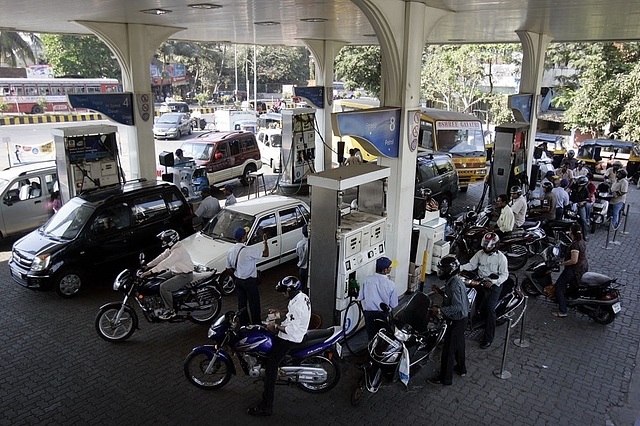
Modi Is Repeating Vajpayee’s Mistake On Oil Deregulation: Petro-Populism Does Not Work
Petro-populism did not help save Vajpayee’s government; it will do nothing to enhance Modi’s chances in 2019, or in the assembly elections up ahead in November and December.
It would be a pity if the BJP now accepts populism as vital to its chances in 2019.
Is National Democratic Alliance - 2 (NDA-2) under Narendra Modi repeating the mistakes of NDA-1 under Atal Bihari Vajpayee in the oil sector?
Sharp cuts in petrol and diesel taxes were announced last Friday (5 October), wherein central excise was cut by Rs 1.50 a litre, oil marketing companies asked to absorb another Re 1 in rising costs, and BJP-ruled states providing matching cuts in their own taxes, thus bringing down prices by upto Rs 5 a litre – at least temporarily.
Quite apart from the reality that this cut may soon be neutralised if oil prices rise further (as seems likely), the policy of cutting rates is bad in principle for it essentially marks a step backwards from one of the most sensible policies adopted by the Modi government: deregulation of petro-fuel prices.
The Vajpayee government announced total deregulation of fuel prices in 2003-04, but months before the elections, it rolled the decision back “temporarily”. One presumes that the Modi rollback of deregulation is also temporary, but eight months – from October 2018 to May 2019, when election season will be brought to a close, is not “temporary” by any stretch of imagination. And if the Lok Sabha elections bring a shaky coalition to power, one can bet that the next government will also balk at raising rates, or restoring status quo on price deregulation.
One can empathise with the Modi government’s predicament, where political pressures to cut prices were becoming overwhelming; add the prospect of the difficult assembly elections looming ahead, and one can accept that there may have been a political need to cut prices.
But there are right ways and wrong ways of doing even politically convenient price cuts. Cutting excise, and letting revenues slide for a while, is perhaps okay, though it all depends on how oil prices behave in the next few months. But forcing oil marketing companies to share the costs is unacceptable. Not only does it bring uncertainty to their bottomlines, it is an explicit abandonment of the idea of deregulation.
One of the Modi government’s best achievements has been the restoration of both fiscal rectitude and the health of oil companies’ finances. Now both are in jeopardy.
Deregulation means the government does not interfere with pricing; it can mess around all it wants with direct subsidies or taxes, but not with pricing, which ought to remain the prerogative of the producer. The same applies to cooking gas and kerosene, even after DBT (direct benefits transfers). The prices must move up and down with costs, while subsidies can rise or fall to cushion the blow for consumers, if that is what the government wants. Not advisable, but at least it does not meddle with market dynamics.
For too long, and especially under the United Progressive Alliance (UPA), we have been fooling around with functioning markets. The UPA messed up the fuel, food and land markets through its legislative and other moves. It is a pity that the Modi government has given in to the same temptation by messing with market pricing in an election year.
It is also foolish for the NDA to believe that a Rs 5 cut is going to save it the blushes on results day. Voters are not that dumb as to not realise that election-eve cuts in fuel taxes may be reversed the minute voting is over and results are announced on 11 December.
UPA-2 brought in the Food Security and Land Acquisition Bills and also split Andhra Pradesh during its last year in power in the hope that all this will help it stay in government in May 2014. But that was not to be. The NDA will also realise that voters don’t always respond positively to such sops when given at the last minute.
In fact, voters will probably appreciate honesty more than sops. If the Prime Minister, while offering some cuts, had addressed the nation saying that while he understands the pain of high fuel prices, he has to alert the nation that cutting taxes cannot continue forever. He should have prepared voters for possible price increases later.
Voters backed Modi when he did demonetisation precisely because he demonstrated that he would take the right decisions even if had to face political flak for the same. They bore the pain and voted the BJP to power with overwhelming majorities in UP and Uttarakhand.
It would be a pity if the party now accepts populism as vital to its chances in 2019. Petro-populism did not help save Vajpayee’s government; it will do nothing to enhance Modi’s chances in 2019, or in the assembly elections up ahead in November and December.